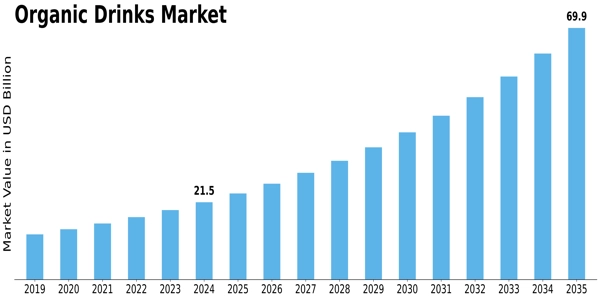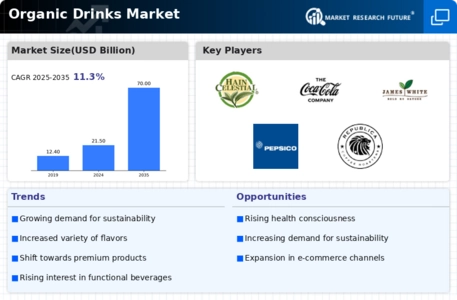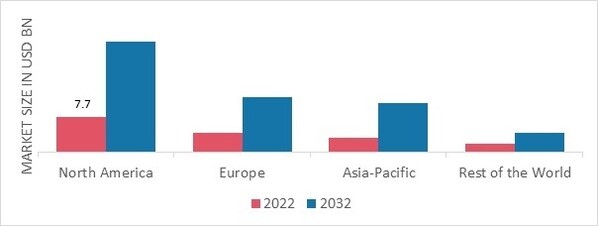-
EXECUTIVE SUMMARY
-
1.1.
-
Market Attractiveness Analysis
-
Type
-
1.1.3.
-
Global Organic Drinks Market, by Type
-
Global Organic Drinks Market, by Packaging
-
Global Organic Drinks Market, by Distribution
-
Global Organic Drinks Market, by Region
-
MARKET INTRODUCTION
-
Definition
-
Scope of the Study
-
Market Structure
-
Key Buying Criteria
-
Macro Factor Indicator
-
Analysis
-
3.
-
RESEARCH METHODOLOGY
-
3.1.
-
Research Process
-
3.2.
-
Primary Research
-
3.3.
-
Secondary Research
-
3.4.
-
Market Size Estimation
-
3.5.
-
Forecast Model
-
3.6.
-
List of Assumptions
-
4.
-
MARKET DYNAMICS
-
4.1.
-
Introduction
-
4.2.
-
Drivers
-
4.2.1.
-
Driver 1
-
4.2.2.
-
Driver 2
-
4.3.
-
Restraints
-
4.3.1.
-
Restraint 1
-
4.3.2.
-
Restraint 2
-
4.4.
-
Opportunities
-
4.4.1.
-
Opportunity 1
-
4.4.2.
-
Opportunity 2
-
4.5.
-
Challenges
-
4.5.1.
-
Challenge 1
-
4.5.2.
-
Challenge 2
-
5.
-
MARKET FACTOR ANALYSIS
-
5.1.
-
Value Chain Analysis
-
5.2.
-
Supply Chain Analysis
-
5.3.
-
Porter’s Five Forces Model
-
Bargaining Power of Suppliers
-
Bargaining Power of Buyers
-
Threat of New Entrants
-
Threat of Substitutes
-
Intensity of Rivalry
-
GLOBAL ORGANIC DRINKS
-
MARKET, BY TYPE
-
6.1.
-
Introduction
-
6.2.
-
Alcoholic
-
6.2.1.
-
Alcoholic: Market Estimates & Forecast by Region/Country, 2023–2032
-
Estimates & Forecast by Region/Country, 2023–2032
-
by Region/Country, 2023–2032
-
by Region/Country, 2023–2032
-
Forecast by Region/Country, 2023–2032
-
Forecast by Region/Country, 2023–2032
-
by Region/Country, 2023–2032
-
Wines
-
Wines: Market
-
Others
-
Others: Market Estimates & Forecast
-
Non-Alcoholic
- Non-Alcoholic: Market Estimates & Forecast
- Coffee & Tea
- Juices & Nectars
- Others
-
GLOBAL ORGANIC DRINKS MARKET, BY PACKAGING TYPE
-
Introduction
-
Bottles
- Bottles: Market
-
Estimates & Forecast by Region/Country, 2023–2032
-
Cans
- Cans: Market Estimates & Forecast by Region/Country,
-
7.4.
-
Others
-
7.4.1.
-
Others: Market Estimates & Forecast by Region/Country, 2023–2032
-
GLOBAL ORGANIC DRINKS
-
MARKET, BY DISTRIBUTION
-
Introduction
-
Store-Based
- Store-Based: Market Estimates & Forecast by Region/Country,
- Convenience Stores
- Others
-
8.2.2.
-
Supermarket & Hypermarket
-
by Region/Country, 2023–2032
-
Forecast by Region/Country, 2023–2032
-
by Region/Country, 2023–2032
-
Non-Store-Based
- Non-Store-Based: Market Estimates & Forecast
-
by Region/Country, 2023–2032
-
GLOBAL ORGANIC DRINKS MARKET MARKET, BY REGION
-
Introduction
-
North America
- Market Estimates
- Market Estimates & Forecast by Packaging Type,
- Market Estimates &
- US
- Mexico
-
& Forecast by Type, 2023–2032
-
9.2.3.
-
Market Estimates & Forecast by Distribution, 2023–2032
-
Forecast by Country, 2023–2032
-
& Forecast by Packaging Type, 2023–2032
-
9.2.6.
-
Canada
-
9.2.6.1.
-
Market Estimates & Forecast by Type, 2023–2032
-
Type, 2023–2032
-
9.2.6.3.
-
Market Estimates & Forecast by Distribution, 2023–2032
-
Forecast by Type, 2023–2032
-
& Forecast by Distribution, 2023–2032
-
Europe
- Market Estimates & Forecast by Type, 2023–2032
- Market Estimates
- Market Estimates & Forecast by Distribution,
- Germany
- UK
- Spain
- Italy
- Rest of Europe
-
& Forecast by Packaging Type, 2023–2032
-
9.3.4.
-
Market Estimates & Forecast by Country, 2023–2032
-
9.3.5.2.
-
Market Estimates & Forecast by Packaging Type, 2023–2032
-
Forecast by Distribution, 2023–2032
-
& Forecast by Packaging Type, 2023–2032
-
9.3.7.
-
France
-
9.3.7.1.
-
Market Estimates & Forecast by Type, 2023–2032
-
Type, 2023–2032
-
9.3.7.3.
-
Market Estimates & Forecast by Distribution, 2023–2032
-
Forecast by Type, 2023–2032
-
& Forecast by Distribution, 2023–2032
-
9.3.9.2.
-
Market Estimates & Forecast by Packaging Type, 2023–2032
-
Forecast by Distribution, 2023–2032
-
9.3.10.2.
-
Market Estimates & Forecast by Packaging Type, 2023–2032
-
Forecast by Distribution, 2023–2032
-
Asia-Pacific
- Market Estimates & Forecast by Type, 2023–2032
- Market Estimates
- Market Estimates & Forecast by Distribution,
- China
- Japan
- India
- Australia & New Zealand
- Rest of Asia-Pacific
-
& Forecast by Packaging Type, 2023–2032
-
9.4.4.
-
Market Estimates & Forecast by Country, 2023–2032
-
9.4.5.2.
-
Market Estimates & Forecast by Packaging Type, 2023–2032
-
Forecast by Distribution, 2023–2032
-
9.4.6.2.
-
Market Estimates & Forecast by Packaging Type, 2023–2032
-
Forecast by Distribution, 2023–2032
-
9.4.7.2.
-
Market Estimates & Forecast by Packaging Type, 2023–2032
-
Forecast by Distribution, 2023–2032
-
Forecast by Type, 2023–2032
-
& Forecast by Distribution, 2023–2032
-
9.4.9.2.
-
Market Estimates & Forecast by Packaging Type, 2023–2032
-
Forecast by Distribution, 2023–2032
-
Rest of the World
- Market Estimates & Forecast by Type, 2023–2032
- Market Estimates
- Market Estimates & Forecast by Distribution,
- South America
- Middle East
- Africa
-
& Forecast by Packaging Type, 2023–2032
-
9.5.4.
-
Market Estimates & Forecast by Region, 2023–2032
-
9.5.5.2.
-
Market Estimates & Forecast by Packaging Type, 2023–2032
-
Forecast by Distribution, 2023–2032
-
9.5.6.2.
-
Market Estimates & Forecast by Packaging Type, 2023–2032
-
Forecast by Distribution, 2023–2032
-
9.5.7.2.
-
Market Estimates & Forecast by Packaging Type, 2023–2032
-
Forecast by Distribution, 2023–2032
-
COMPETITIVE LANDSCAPE
-
Introduction
-
Competitive Benchmarking
-
Development Share Analysis
-
Key Developments
-
& Growth Strategies
-
COMPANY PROFILES
-
Hain Celestial
- Company Overview
- Financial Overview
- Products Offered
- Key Developments
- SWOT Analysis
- Key Strategies
-
Suja Life, LLC
- Company Overview
- Financial Overview
- Products Offered
- Key Developments
- SWOT Analysis
- Key Strategies
-
the Coca-Cola Company
- Company Overview
- Financial Overview
- Products Offered
- Key Developments
- SWOT Analysis
- Key Strategies
-
Danone SA
- Company Overview
- Financial Overview
- Products Offered
- Key Developments
- SWOT Analysis
- Key Strategies
-
Purity Organic, LLC
- Company Overview
- Financial Overview
- Products Offered
- Key Developments
- SWOT Analysis
- Key Strategies
-
the Better Drinks Co.
- Company Overview
- Financial Overview
- Products Offered
- Key Developments
- SWOT Analysis
- Key Strategies
-
Parker''s Organic Juices Pty Ltd
- Company Overview
- Financial Overview
- Products Offered
- Key Developments
- SWOT Analysis
- Key Strategies
-
Bison Organic Beer
- Company Overview
- Financial Overview
- Products Offered
- Key Developments
- SWOT Analysis
- Key Strategies
-
James White Drinks
- Company Overview
- Financial Overview
- Products Offered
- Key Developments
- SWOT Analysis
- Key Strategies
-
Ltd.
-
11.9.1.
-
Company Overview
-
11.9.2.
-
Financial Overview
-
11.9.3.
-
Products Offered
-
11.9.4.
-
Key Developments
-
11.9.5.
-
SWOT Analysis
-
11.9.6.
-
Key Strategies
-
11.10.
-
PepsiCo, Inc.
-
11.10.1.
-
Company Overview
-
11.10.2.
-
Financial Overview
-
11.10.3.
-
Products Offered
-
11.10.4.
-
Key Developments
-
11.10.5.
-
SWOT Analysis
-
11.10.6.
-
Key Strategies
-
11.11.
-
Nutrition & Sante Iberia, S.L.
-
Republica Coffee
- Company Overview
- Financial Overview
- Products Offered
- Key Developments
- SWOT Analysis
- Key Strategies
-
The WhiteWave Foods Company
- Company Overview
- Financial Overview
- Products Offered
- Key Developments
- SWOT Analysis
- Key Strategies
-
Alnatura Produktions
- Company Overview
- Financial Overview
- Products Offered
- Key Developments
- SWOT Analysis
- Key Strategies
-
& Handels GmbH
-
11.14.1.
-
Company Overview
-
11.14.2.
-
Financial Overview
-
11.14.3.
-
Products Offered
-
11.14.4.
-
Key Developments
-
11.14.5.
-
SWOT Analysis
-
11.14.6.
-
Key Strategies
-
11.15.
-
Parkers Organic Juices PTY LTD
-
APPENDIX
-
General Sources & References
-
List of Abbreviation
-
-
LIST OF TABLES
-
Global Organic Drinks
-
Market, by Region, 2023–2032 (USD Million)
-
Global Organic Drinks Market, by Type, 2023–2032
-
(USD Million)
-
Table
-
Global Organic Drinks Market, by Packaging Type,2023–2032 (USD Million)
-
Global Organic
-
Drinks Market, by Distribution, 2023–2032 (USD Million)
-
North America: Organic
-
Drinks Market, by Country, 2023–2032 (USD Million)
-
North America: Organic Drinks Market, by
-
Type, 2023–2032 (USD Million)
-
North America: Organic Drinks Market, by Packaging
-
Type, 2023–2032 (USD Million)
-
North America: Organic Drinks Market, by Distribution,
-
US: Organic Drinks Market, by Type, 2023–2032 (USD Million)
-
US: Organic
-
Drinks Market, by Packaging Type, 2023–2032 (USD Million)
-
US: Organic Drinks Market,
-
by Distribution, 2023–2032 (USD Million)
-
Canada: Organic Drinks Market, by Type,
-
Canada: Organic Drinks Market, by Packaging Type, 2023–2032
-
(USD Million)
-
Table
-
Canada: Organic Drinks Market, by Distribution, 2023–2032 (USD Million)
-
Mexico: Organic
-
Drinks Market, by Type, 2023–2032 (USD Million)
-
Mexico: Organic Drinks Market, by Packaging
-
Type, 2023–2032 (USD Million)
-
Mexico: Organic Drinks Market, by Distribution,
-
Europe: Organic Drinks Market, by Country, 2023–2032
-
(USD Million)
-
Table
-
Europe: Organic Drinks Market, by Type, 2023–2032 (USD Million)
-
Europe: Organic
-
Drinks Market, by Packaging Type, 2023–2032 (USD Million)
-
Europe: Organic Drinks
-
Market, by Distribution, 2023–2032 (USD Million)
-
Germany: Organic Drinks Market, by Type,
-
Germany: Organic Drinks Market, by Packaging Type, 2023–2032
-
(USD Million)
-
Table
-
Germany: Organic Drinks Market, by Distribution, 2023–2032 (USD Million)
-
France: Organic
-
Drinks Market, by Type, 2023–2032 (USD Million)
-
France: Organic Drinks Market, by Packaging
-
Type,2023–2032 (USD Million)
-
France: Organic Drinks Market, by Distribution,
-
Italy: Organic Drinks Market, by Type, 2023–2032 (USD
-
Million)
-
Table
-
Italy: Organic Drinks Market, by Packaging Type, 2023–2032 (USD Million)
-
Italy: Organic
-
Drinks Market, by Distribution, 2023–2032 (USD Million)
-
Spain: Organic Drinks
-
Market, by Type, 2023–2032 (USD Million)
-
Spain: Organic Drinks Market, by Packaging
-
Type, 2023–2032 (USD Million)
-
Spain: Organic Drinks Market, by Distribution,
-
UK: Organic Drinks Market, by Type, 2023–2032 (USD Million)
-
UK: Organic
-
Drinks Market, by Packaging Type, 2023–2032 (USD Million)
-
UK: Organic Drinks Market,
-
by Distribution, 2023–2032 (USD Million)
-
Rest of Europe: Organic Drinks Market, by
-
Type, 2023–2032 (USD Million)
-
Rest of Europe: Organic Drinks Market, by Packaging
-
Type, 2023–2032 (USD Million)
-
Rest of Europe: Organic Drinks Market, by Distribution,
-
Asia-Pacific: Organic Drinks Market, by Country, 2023–2032
-
(USD Million)
-
Table
-
Asia-Pacific: Organic Drinks Market, by Type, 2023–2032 (USD Million)
-
Asia-Pacific:
-
Organic Drinks Market, by Packaging Type, 2023–2032 (USD Million)
-
Asia-Pacific:
-
Organic Drinks Market, by Distribution, 2023–2032 (USD Million)
-
China: Organic
-
Drinks Market, by Type, 2023–2032 (USD Million)
-
China: Organic Drinks Market, by Packaging
-
Type, 2023–2032 (USD Million)
-
China: Organic Drinks Market, by Distribution,
-
India: Organic Drinks Market, by Type, 2023–2032 (USD
-
Million)
-
Table
-
India: Organic Drinks Market, by Packaging Type, 2023–2032 (USD Million)
-
India: Organic
-
Drinks Market, by Distribution, 2023–2032 (USD Million)
-
Japan: Organic Drinks
-
Market, by Type, 2023–2032 (USD Million)
-
Japan: Organic Drinks Market, by Packaging
-
Type, 2023–2032 (USD Million)
-
Japan: Organic Drinks Market, by Distribution,
-
Australia & New Zealand: Organic Drinks Market, by Type,
-
Australia & New Zealand: Organic Drinks Market, by Packaging
-
Type, 2023–2032 (USD Million)
-
Australia & New Zealand: Organic Drinks Market,
-
by Distribution, 2023–2032 (USD Million)
-
Rest of Asia-Pacific: Organic Drinks Market,
-
by Type, 2023–2032 (USD Million)
-
Rest of Asia-Pacific: Organic Drinks Market, by
-
Packaging Type,2023–2032 (USD Million)
-
Rest of Asia-Pacific: Organic Drinks Market,
-
by Distribution, 2023–2032 (USD Million)
-
Rest of the World (RoW): Organic Drinks
-
Market, by Country, 2023–2032 (USD Million)
-
Rest of the World (RoW): Organic Drinks
-
Market, by Type, 2023–2032 (USD Million)
-
Rest of the World (RoW): Organic Drinks
-
Market, by Packaging Type, 2023–2032 (USD Million)
-
Rest of the World (RoW): Organic Drinks
-
Market, by Distribution, 2023–2032 (USD Million)
-
South America: Organic Drinks Market, by
-
Type, 2023–2032 (USD Million)
-
South America: Organic Drinks Market, by Packaging
-
Type,2023–2032 (USD Million)
-
South America: Organic Drinks Market, by Distribution,
-
Middle East: Organic Drinks Market, by Type, 2023–2032
-
(USD Million)
-
Table
-
Middle East: Organic Drinks Market, by Packaging Type, 2023–2032 (USD Million)
-
Middle East:
-
Organic Drinks Market, by Distribution, 2023–2032 (USD Million)
-
Africa: Organic
-
Drinks Market, by Type, 2023–2032 (USD Million)
-
Africa: Organic Drinks Market, by Packaging
-
Type, 2023–2032 (USD Million)
-
Africa: Organic Drinks Market, by Distribution,
-
-
LIST OF FIGURES
-
Global Organic Drinks Market Segmentation
-
Forecast Research Methodology
-
Five Forces
-
Analysis of the Global Organic Drinks Market
-
Value Chain of the Global Organic Drinks
-
Market
-
FIGURE
-
Share of the Global Organic Drinks Market in 2020, by Country (%)
-
Global Organic Drinks
-
Market, by Region, 2023–2032,
-
Global Organic Drinks Market Size, by Type, 2020
-
Share of the
-
Global Organic Drinks Market, by Type, 2023–2032 (%)
-
Global Organic Drinks Market Size, by Packaging
-
Type, 2020
-
FIGURE
-
Share of the Global Organic Drinks Market, by Packaging Type, 2023–2032
-
(%)
-
FIGURE
-
Global Organic Drinks Market Size, by Distribution, 2020
-
Share of the Global Organic Drinks Market,
-
by Distribution, 2023–2032 (%)










Leave a Comment